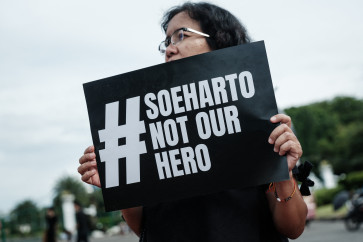Popular Reads
Top Results
Can't find what you're looking for?
View all search resultsPopular Reads
Top Results
Can't find what you're looking for?
View all search resultsA mass or nonprofit organization bill?
After several postponements and fierce criticism, a bill drafted for mass organization will be legalized this month
Change text size
Gift Premium Articles
to Anyone
A
fter several postponements and fierce criticism, a bill drafted for mass organization will be legalized this month. Societal dynamics mean that Law No. 8/1985 on mass organizations is no longer adequate for accommodating and guaranteeing the freedom to establish a union, to congregate and to express opinions as stated in the 1945 Constitution.
There are suspicions that the bill contains strong elements of control. The government is of the opinion that the bill is needed in a practical sense, including for enforcing order in relation to the conduct of mass organizations, which often cause societal disturbances. The bill is expected to provide a legal basis for enforcing order.
The bill has lost two basic aspects needed for a law. First, it fails to capture societal dynamics and second, it lacks a focus on the accountability of organizations to society.
At present, there is a wide range of institutions emanating from society, with various legal statuses and memberships, such as associations of industries, professions, religious institutions, charities, educational institutions, political parties, foundations, societies (perkumpulan), ethnic groups, orphanages and the like. These institutions work for society and resources come from society, either directly or indirectly, but they are not yet regulated sufficiently in a comprehensive bill.
The bill for mass organizations needs to provide a legal umbrella for these institutions and for other forms that may emerge in the future.
All forms of organizations previously mentioned share a similarity: They are not profit oriented. This means that what we need is not a mass organization bill, but a nonprofit organization bill.
The bill will serve as an umbrella, a foundation law for regulating associations and even other laws such as on pramuka (scouts), political parties, the National Sports Council (KONI), the Indonesian Red Cross and more.
Within a nonprofit scope, society is free to establish mass organizations in various forms, with a flexible scope of activities. The function of government in this case is to facilitate registration and ensure transparency and accountability to society. The Home Ministry will need to more proactively facilitate the registration of these mass organizations.
The list of mass organizations at the ministry is currently below 1,000. In reality, the number of NGOs, foundations and associations is far beyond that.
Another aspect not included [in this regulation] is accountability. The bill does not regulate how mass organizations are accountable for funding sources and their utilization in society, as well as lacking in transparency requirements.
This is in contrast to the strength of the nonprofit sector. The legitimacy of the nonprofit sector depends on its transparency and accountability to society.
Other sectors, public and private, have established their mechanisms for accountability. The third sector, civil society, is the third pillar for nation building.
It is a common per ception that this pillar trails behind the other two, even though it has been present for quite some time.
The absence of an accountability mechanism gives room for misconduct. Civil society organizations are being abused as business ventures and are therefore not paying taxes.
It is a similar situation with organizations that collect funds from society without responsibility for reporting the utilization of these funds. Simply put, organizations exploit conditions in society to gain funding from donor or government organizations. These organizations claim to be society-based organizations, without society feeling that they are represented and without society having any knowledge of such organizations.
The registration of non-profit organizations to the government is not a mechanism of control. Each organization needs to register to be assisted with its accountability measures in the long term. Then the Home Ministry can establish a database and website containing financial and operational reports of all registered organizations.
This can lead to better mechanisms to enforce regulations. Organizations that do not submit their reports can be removed from the list. Society can get guarantees of the legitimacy of an organization by accessing the website and the government can provide assurances of transparency and accountability for each organization listed there.
The writer is executive director of Yayasan Bina Integrasi Edukasi (YBIE), which campaigns for nonprofit organizations in Indonesia.










